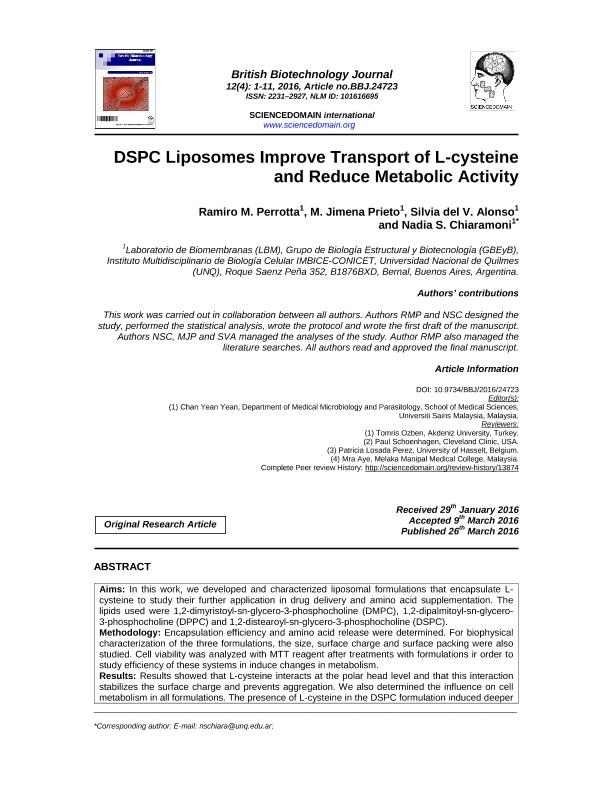Mostrar el registro sencillo del ítem
dc.contributor.author
Perrotta, Ramiro Martin

dc.contributor.author
Prietto, Jimena
dc.contributor.author
Alonso, Silvia del Valle

dc.contributor.author
Chiaramoni, Nadia Silvia

dc.date.available
2018-08-06T18:40:20Z
dc.date.issued
2016-02
dc.identifier.citation
Perrotta, Ramiro Martin; Prietto, Jimena; Alonso, Silvia del Valle; Chiaramoni, Nadia Silvia; DSPC Liposomes Improve Transport of L-cysteine and Reduce Metabolic Activity; ScienceDomain International; British Biotechnology Journal; 12; 4; 2-2016; 1-11
dc.identifier.issn
2231-292
dc.identifier.uri
http://hdl.handle.net/11336/54298
dc.description.abstract
Aims: In this work, we developed and characterized liposomal formulations that encapsulate L-cysteine to study their further application in drug delivery and amino acid supplementation. The lipids used were 1,2-dimyristoyl-sn-glycero-3-phosphocholine (DMPC), 1,2-dipalmitoyl-sn-glycero-3-phosphocholine (DPPC) and 1,2-distearoyl-sn-glycero-3-phosphocholine (DSPC).Methodology: Encapsulation efficiency and amino acid release were determined. For biophysical characterization of the three formulations, the size, surface charge and surface packing were also studied. Cell viability was analyzed with MTT reagent after treatments with formulations ir order to study efficiency of these systems in induce changes in metabolism.Results: Results showed that L-cysteine interacts at the polar head level and that this interaction stabilizes the surface charge and prevents aggregation. We also determined the influence on cell metabolism in all formulations. The presence of L-cysteine in the DSPC formulation induced deeper changes in metabolism, evidencing that this formulation provides better transport of this amino acid.Conclusion: Liposomes developed herein are well suited for the application in the delivery of L-cysteine. Particularly, they can encapsulate nearly all the L-cysteine and can retain it for 6 hours. Also, L-cysteine stabilized liposomes, preventing their aggregation. L-cysteine encapsulated in the DSPC formulation induced deeper changes in cell metabolism, causing a decrease in metabolic activity; this was probably due to a higher entry, thus a better liposome-mediated transport. Considering that the smaller the particle, the better the circulation, we believe that the stabilization of the vesicle by L-cysteine may allow these transporters to have higher circulation times. Based on the above, we conclude that the DSPC formulation is the best suited for further application in L-cysteine delivery.
dc.format
application/pdf
dc.language.iso
eng
dc.publisher
ScienceDomain International
dc.rights
info:eu-repo/semantics/openAccess
dc.rights.uri
https://creativecommons.org/licenses/by-nc-sa/2.5/ar/
dc.subject
Liposomes
dc.subject
L-Cysteine
dc.subject
Ftir
dc.subject
Cell Metabolism
dc.subject.classification
Nano-materiales

dc.subject.classification
Nanotecnología

dc.subject.classification
INGENIERÍAS Y TECNOLOGÍAS

dc.title
DSPC Liposomes Improve Transport of L-cysteine and Reduce Metabolic Activity
dc.type
info:eu-repo/semantics/article
dc.type
info:ar-repo/semantics/artículo
dc.type
info:eu-repo/semantics/publishedVersion
dc.date.updated
2018-08-03T14:17:39Z
dc.journal.volume
12
dc.journal.number
4
dc.journal.pagination
1-11
dc.journal.pais
Reino Unido

dc.description.fil
Fil: Perrotta, Ramiro Martin. Universidad Nacional de Quilmes. Departamento de Ciencia y Tecnología. Laboratorio de Biomembranas; Argentina. Consejo Nacional de Investigaciones Científicas y Técnicas; Argentina
dc.description.fil
Fil: Prietto, Jimena. Universidad Nacional de Quilmes. Departamento de Ciencia y Tecnología. Laboratorio de Biomembranas; Argentina
dc.description.fil
Fil: Alonso, Silvia del Valle. Universidad Nacional de Quilmes. Departamento de Ciencia y Tecnología. Laboratorio de Biomembranas; Argentina. Consejo Nacional de Investigaciones Científicas y Técnicas; Argentina
dc.description.fil
Fil: Chiaramoni, Nadia Silvia. Universidad Nacional de Quilmes. Departamento de Ciencia y Tecnología. Laboratorio de Biomembranas; Argentina. Consejo Nacional de Investigaciones Científicas y Técnicas; Argentina
dc.journal.title
British Biotechnology Journal
dc.relation.alternativeid
info:eu-repo/semantics/altIdentifier/doi/http://dx.doi.org/10.9734/BBJ/2016/24723
dc.relation.alternativeid
info:eu-repo/semantics/altIdentifier/url/http://sciencedomain.org/abstract/13874
Archivos asociados
